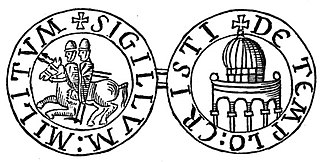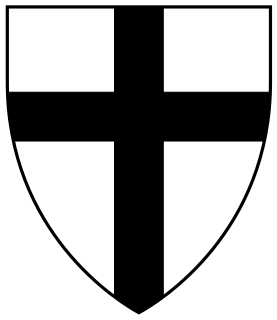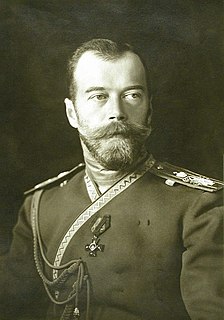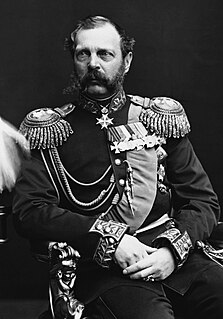Protective order may refer to:
| This disambiguation page lists articles associated with the title Protective order. If an internal link led you here, you may wish to change the link to point directly to the intended article. |
Protective order may refer to:
| This disambiguation page lists articles associated with the title Protective order. If an internal link led you here, you may wish to change the link to point directly to the intended article. |

Actinopterygii, or the ray-finned fishes, constitute a class or subclass of the bony fishes.

Alexander III was the Emperor of Russia, King of Poland, and Grand Duke of Finland from 13 March [O.S. 1 March] 1881 until his death on 1 November [O.S. 20 October] 1894. He was highly reactionary and reversed some of the liberal reforms of his father, Alexander II. Under the influence of Konstantin P. Pobedonostsev (1827-1907) he opposed any reform that limited his autocratic rule. During Alexander's reign Russia fought no major wars, and he was therefore styled "The Peacemaker".

The Poor Fellow-Soldiers of Christ and of the Temple of Solomon, also known as the Order of Solomon's Temple, the Knights Templar or simply the Templars, were a Catholic military order recognised in 1139 by the papal bull Omne datum optimum. The order was founded in 1119 and was active until 1312 when it was perpetually suppressed by Pope Clement V by the bull Vox in excelso.

New Order are an English rock band formed in 1980 by vocalist and guitarist Bernard Sumner, bassist Peter Hook, and drummer Stephen Morris. The band formed after the demise of Joy Division, following the suicide of lead singer Ian Curtis; they were joined by Gillian Gilbert on keyboards later that year. New Order's integration of post-punk with electronic and dance music made them one of the most acclaimed and influential bands of the 1980s. They were the flagship band for Manchester-based independent record label Factory Records and its nightclub The Haçienda, and worked in long-term collaboration with graphic designer Peter Saville.

The Order of Brothers of the German House of Saint Mary in Jerusalem, commonly the Teutonic Order, is a Catholic religious order founded as a military order c. 1190 in Acre, Kingdom of Jerusalem.

Edward VII was King of the United Kingdom of Great Britain and Ireland and Emperor of India from 22 January 1901 until his death in 1910.

The Most Noble Order of the Garter is an order of chivalry founded by King Edward III of England in 1348. It is the most senior order of knighthood in the British honours system, outranked in precedence only by the Victoria Cross and the George Cross. The Order of the Garter is dedicated to the image and arms of Saint George, England's patron saint.

The Order of Australia is an order of chivalry established on 14 February 1975 by Elizabeth II, Queen of Australia, to recognise Australian citizens and other persons for achievement or meritorious service. Before the establishment of the order, Australian citizens received British honours.

The Order of Canada is a Canadian national order and the second highest honour for merit in the system of orders, decorations, and medals of Canada. It comes second only to membership in the Order of Merit, which is the personal gift of Canada's monarch.

Law & Order is an American police procedural and legal drama television series created by Dick Wolf, launching the Law & Order franchise. Airing its entire run on NBC, Law & Order premiered on September 13, 1990 and completed its twentieth and final season on May 24, 2010.

Law & Order: Special Victims Unit is an American crime drama television series created by Dick Wolf for NBC. It stars Mariska Hargitay as Olivia Benson, the lead detective of the Special Victims Unit located in a fictionalized version of the New York City Police Department. Christopher Meloni played the other lead detective, Elliot Stabler, until departing from the series after 12 seasons. Law & Order: Special Victims Unit follows the style of the original Law & Order in that episodes are often "ripped from the headlines" or loosely based on real crimes that have received media attention.

The Most Excellent Order of the British Empire is a British order of chivalry, rewarding contributions to the arts and sciences, work with charitable and welfare organisations, and public service outside the civil service. It was established on 4 June 1917 by King George V and comprises five classes across both civil and military divisions, the most senior two of which make the recipient either a knight if male or dame if female. There is also the related British Empire Medal, whose recipients are affiliated with, but not members of, the order.

The Most Honourable Order of the Bath is a British order of chivalry founded by George I on 18 May 1725. The name derives from the elaborate medieval ceremony for appointing a knight, which involved bathing as one of its elements. The knights so created were known as "Knights of the Bath". George I "erected the Knights of the Bath into a regular Military Order". He did not revive the Order of the Bath, since it had never previously existed as an Order, in the sense of a body of knights who were governed by a set of statutes and whose numbers were replenished when vacancies occurred.

The Most Distinguished Order of Saint Michael and Saint George is a British order of chivalry founded on 28 April 1818 by George, Prince Regent, later King George IV, while he was acting as regent for his father, King George III.

The Royal Victorian Order is a dynastic order of knighthood established in 1896 by Queen Victoria. It recognises distinguished personal service to the monarch of the Commonwealth realms, members of the monarch's family, or to any viceroy or senior representative of the monarch. The present monarch, Queen Elizabeth II, is the sovereign of the order, the order's motto is Victoria, and its official day is 20 June. The order's chapel is the Savoy Chapel in London.

The Order of Knights of the Hospital of Saint John of Jerusalem, commonly known as the Knights Hospitaller and the Order of Saint John, was a medieval and early modern Catholic military order. It was headquartered in the Kingdom of Jerusalem until 1291, on the island of Rhodes from 1310 until 1522, in Malta from 1530 until 1798 and at Saint Petersburg from 1799 until 1801. Today several organizations continue the Hospitaller tradition, most importantly the Sovereign Military Order of Malta.

The Illuminati is a name given to several groups, both real and fictitious. Historically, the name usually refers to the Bavarian Illuminati, an Enlightenment-era secret society founded on 1 May 1776. The society's goals were to oppose superstition, obscurantism, religious influence over public life, and abuses of state power. "The order of the day," they wrote in their general statutes, "is to put an end to the machinations of the purveyors of injustice, to control them without dominating them." The Illuminati—along with Freemasonry and other secret societies—were outlawed through edict by the Bavarian ruler Charles Theodore with the encouragement of the Catholic Church, in 1784, 1785, 1787, and 1790. In the following several years, the group was vilified by conservative and religious critics who claimed that they continued underground and were responsible for the French Revolution.

The Amish are a group of traditionalist Christian church fellowships with Swiss German Anabaptist origins. They are closely related to, but distinct from, Mennonite churches. The Amish are known for simple living, plain dress, and reluctance to adopt many conveniences of modern technology.

Nicholas II or Nikolai II, known as Saint Nicholas the Passion-Bearer in the Russian Orthodox Church, was the last Emperor of Russia, ruling from 1 November 1894 until his forced abdication in 15 March 1917. His reign saw the fall of the Russian Empire from one of the foremost great powers of the world to economic and military collapse. He gave limited support to the economic and political reforms promoted by top aides Sergei Witte and Pyotr Stolypin, but they faced too much aristocratic opposition to be fully effective. He supported modernization based on foreign loans and close ties with France. He resisted giving the new parliament major roles. He insisted he ruled by God's grace and was loathe to negotiate or compromise. He was ridiculed as Nicholas the Bloody by his enemies due to the Khodynka Tragedy, anti-Semitic pogroms, Bloody Sunday, the violent suppression of the 1905 Russian Revolution, the repression of political opponents, and his responsibility for defeat in the Russo-Japanese War (1904–1905). His memory was reviled by Soviet historians as a weak and incompetent leader whose decisions led to military defeats and the deaths of millions of his subjects. By contrast Anglo-Russian historian Nikolai Tolstoy, leader of the International Monarchist League, says, "There were many bad things about the tsar's regime, but he inherited an autocracy and his acts are now being seen in perspective and in comparison to the terrible crimes committed by the Soviets."

Alexander II was the Emperor of Russia from 2 March 1855 until his assassination on 13 March 1881. He was also the King of Poland and the Grand Duke of Finland.